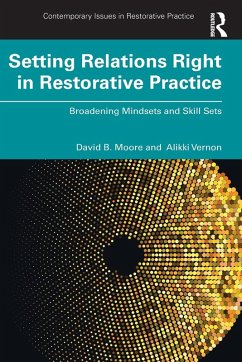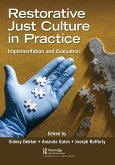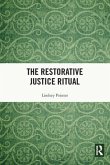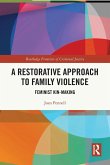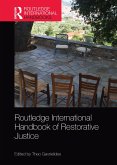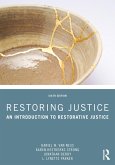Setting Relations Right in Restorative Practice is a practical guide to using restorative processes, both in justice systems, to provide a healing response to harm, and in broader community contexts, to help people co-exist peacefully. Restorative processes can help to establish, maintain, deepen, and repair relationships, and to neutralise the conflict associated with negative relationships. The result is less conflict within people, between people, and between groups, and increasing individual and community wellbeing. These complex goals can be distilled to the single principle of setting relations right.
The authors distil lessons from their decades of work at the frontline of restorative innovation. They outline an accurate, accessible theory that informs a restorative mindset, and describe in detail the corresponding skill set. Succinct, engaging case studies include refinements to existing programs in justice systems. Other case studies include the innovations ofrestorative responses to institutional abuse and to family violence and sexual harm, initiatives to increase psychological safety in schools and workplaces, and programs that support restorative ways-of-working across whole cities or regions. By applying elements from successful programs, practitioners can realise the broader reforming potential of restorative practice.
This book is essential reading for restorative practitioners, administrators, and policymakers, for students and researchers - indeed, for anyone interested in the power and potential of restorative practice and other forms of deliberative decision-making.
The authors distil lessons from their decades of work at the frontline of restorative innovation. They outline an accurate, accessible theory that informs a restorative mindset, and describe in detail the corresponding skill set. Succinct, engaging case studies include refinements to existing programs in justice systems. Other case studies include the innovations ofrestorative responses to institutional abuse and to family violence and sexual harm, initiatives to increase psychological safety in schools and workplaces, and programs that support restorative ways-of-working across whole cities or regions. By applying elements from successful programs, practitioners can realise the broader reforming potential of restorative practice.
This book is essential reading for restorative practitioners, administrators, and policymakers, for students and researchers - indeed, for anyone interested in the power and potential of restorative practice and other forms of deliberative decision-making.
'After a few decades of ample glow yet lagging go in the restorative justice movement, Moore and Vernon offer up a unique and much-needed way forward to fulfil the promise of restorative justice and practices. This book will help many of us already in the field to course-correct, but will surely also help launch new efforts to shine bright right out of the gate. The very real lessons wrought from decades of on-the-ground experience, combined with ringing clarity around theory and guiding principles, creates this must-have book for any government, policy-maker, institution, community organization, and practitioner wanting to maximize the impact of their restorative work.'
Lauren Abramson, Ph.D., Founder, Baltimore Community Conferencing Center (now Restorative Response Baltimore)
'My ancestors experienced life on Aboriginal reserves and government policies which included the forced removal of children who grew up in institutions without the love of and guidance of family. Harsh conditions caused intergenerational trauma and negative social and emotional wellbeing. As Executive Director of our country's first independent Aboriginal Boarding College, I have experienced firsthand the effectiveness of restorative practices. Our community-led restorative project Lotjpadhan provides for culturally informed decision-making and healing for our at-risk young people, families, and communities. Working with David and Alikki on this project is demonstrating how we can walk together, embed Aboriginal ways of knowing, doing, and being into evidence-based interventions, and bring about great change.'
Dr Lois Peeler AM, Yorta Yorta and Wurundjeri Elder, co-founder of Worawa Aboriginal College, and National, and Aborigines and Islanders Day Observance Committee (NAIDOC) 2022 Female Elder of the Year
'A unique and inordinately-important book. On the one hand, Moore and Vernon have processed a vast range and depth of scholarly literature detailing restorative practices and related interdisciplinary fields like social psychology. On the other hand, they have sifted this material with the knowledge drawn from decades of program design, implementation, and restorative work. The result is a profoundly insightful and deeply compelling statement of restorative practices that will do nothing less than benchmark the field moving forward.'
Douglas Campbell, Professor of New Testament, and co-director of the Duke Divinity School Prison Program
'Some years ago, I wrote The Jack Manning trilogy, three plays which portrayed the drama of transforming conflict into cooperation through group conferences in families, work units, and organisations. The plays also posed the larger question of what else might be possible with a restorative process. This book answers that question, with practical guidelines for responding to injustice - effectively, collectively, and non-violently.'
David Williamson AO, Australian dramatist and playwright, author of five miniseries, twelve screenplays, and fifty plays, including Face to Face, A Conversation, and Charitable Intent
'This long-awaited contribution to the restorative justice discourse unpacks various applications of restorative practices in a practical way, with the safeguards, assessment, and sophistication required to do it well. The book challenges the 'win' or 'lose' nature of adversarial processes, and identifies opportunities for healing and recovery. The authors bring a theoretical framework, but also unique expertise and on the ground experience of administering and evaluating restorative practices in many different situations and contexts. The critical analysis is useful not only for academic and practitioner audiences, but also for policy makers and programme administrators.'
Liz Curran, Associate Professor of Clinical Legal Education, Nottingham Trent University, author of Better Law for a Better World
In Setting Relations Right in Restorative Practice, Moore and Vernon achieve their stated aims of increasing the "know-how" of both facilitating restorative processes and the administration of restorative programs. The authors set out clear, tested strategies and practices. Through definitional clarity, revisiting RJ's Occidental and Oriental origin stories and emergence, and clear case examples, Moore and Vernon offer paths for setting relations right within the restorative justice and practices movement itself.
Setting Relations Right in Restorative Practice is a welcome, unique, and timely addition to the restorative justice and practices literature. Welcome is the challenge to restorativists to ensure that reflective learning processes in training, facilitation, program design and administration are prioritized. Unique in being informed by years of experience in a wide range of institutional settings and levels beyond their marginalized status with youthful offending and post-conviction applications. Timely in arriving at an important moment in restorative justice's emerging realization as a social movement in the face of strong headwinds from the rise of authoritarian impulses. This is a hopeful, inspiring work grounded in substantive theory and research, steeped in years of reflective experience on the parts of the authors, beautifully written in a style that will appeal to practitioner-facilitators, program designers and administrators and leaders.
Gale Burford Emeritus Professor, Distinguished Visiting Scholar of Restorative Justice at Vermont Law School, editor of Restorative and Responsive Human Services
Lauren Abramson, Ph.D., Founder, Baltimore Community Conferencing Center (now Restorative Response Baltimore)
'My ancestors experienced life on Aboriginal reserves and government policies which included the forced removal of children who grew up in institutions without the love of and guidance of family. Harsh conditions caused intergenerational trauma and negative social and emotional wellbeing. As Executive Director of our country's first independent Aboriginal Boarding College, I have experienced firsthand the effectiveness of restorative practices. Our community-led restorative project Lotjpadhan provides for culturally informed decision-making and healing for our at-risk young people, families, and communities. Working with David and Alikki on this project is demonstrating how we can walk together, embed Aboriginal ways of knowing, doing, and being into evidence-based interventions, and bring about great change.'
Dr Lois Peeler AM, Yorta Yorta and Wurundjeri Elder, co-founder of Worawa Aboriginal College, and National, and Aborigines and Islanders Day Observance Committee (NAIDOC) 2022 Female Elder of the Year
'A unique and inordinately-important book. On the one hand, Moore and Vernon have processed a vast range and depth of scholarly literature detailing restorative practices and related interdisciplinary fields like social psychology. On the other hand, they have sifted this material with the knowledge drawn from decades of program design, implementation, and restorative work. The result is a profoundly insightful and deeply compelling statement of restorative practices that will do nothing less than benchmark the field moving forward.'
Douglas Campbell, Professor of New Testament, and co-director of the Duke Divinity School Prison Program
'Some years ago, I wrote The Jack Manning trilogy, three plays which portrayed the drama of transforming conflict into cooperation through group conferences in families, work units, and organisations. The plays also posed the larger question of what else might be possible with a restorative process. This book answers that question, with practical guidelines for responding to injustice - effectively, collectively, and non-violently.'
David Williamson AO, Australian dramatist and playwright, author of five miniseries, twelve screenplays, and fifty plays, including Face to Face, A Conversation, and Charitable Intent
'This long-awaited contribution to the restorative justice discourse unpacks various applications of restorative practices in a practical way, with the safeguards, assessment, and sophistication required to do it well. The book challenges the 'win' or 'lose' nature of adversarial processes, and identifies opportunities for healing and recovery. The authors bring a theoretical framework, but also unique expertise and on the ground experience of administering and evaluating restorative practices in many different situations and contexts. The critical analysis is useful not only for academic and practitioner audiences, but also for policy makers and programme administrators.'
Liz Curran, Associate Professor of Clinical Legal Education, Nottingham Trent University, author of Better Law for a Better World
In Setting Relations Right in Restorative Practice, Moore and Vernon achieve their stated aims of increasing the "know-how" of both facilitating restorative processes and the administration of restorative programs. The authors set out clear, tested strategies and practices. Through definitional clarity, revisiting RJ's Occidental and Oriental origin stories and emergence, and clear case examples, Moore and Vernon offer paths for setting relations right within the restorative justice and practices movement itself.
Setting Relations Right in Restorative Practice is a welcome, unique, and timely addition to the restorative justice and practices literature. Welcome is the challenge to restorativists to ensure that reflective learning processes in training, facilitation, program design and administration are prioritized. Unique in being informed by years of experience in a wide range of institutional settings and levels beyond their marginalized status with youthful offending and post-conviction applications. Timely in arriving at an important moment in restorative justice's emerging realization as a social movement in the face of strong headwinds from the rise of authoritarian impulses. This is a hopeful, inspiring work grounded in substantive theory and research, steeped in years of reflective experience on the parts of the authors, beautifully written in a style that will appeal to practitioner-facilitators, program designers and administrators and leaders.
Gale Burford Emeritus Professor, Distinguished Visiting Scholar of Restorative Justice at Vermont Law School, editor of Restorative and Responsive Human Services

